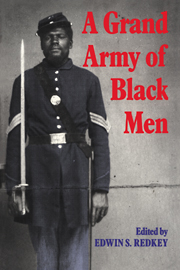Book contents
- Frontmatter
- Contents
- Preface
- Acknowledgments
- List of Abbreviations
- Introduction: For Freedom and Equality
- 1 Black Soldiers in White Regiments
- 2 South Carolina, Georgia, and Florida
- 3 Virginia and North Carolina
- 4 The Gulf States
- 5 Occupation Duty
- 6 For the Rights of Citizens
- 7 The Struggle for Equal Pay
- 8 Racism in the Army
- 9 The Navy
- 10 War's End
- Index
- Cambridge Cultural Social Studies
3 - Virginia and North Carolina
Published online by Cambridge University Press: 24 March 2010
- Frontmatter
- Contents
- Preface
- Acknowledgments
- List of Abbreviations
- Introduction: For Freedom and Equality
- 1 Black Soldiers in White Regiments
- 2 South Carolina, Georgia, and Florida
- 3 Virginia and North Carolina
- 4 The Gulf States
- 5 Occupation Duty
- 6 For the Rights of Citizens
- 7 The Struggle for Equal Pay
- 8 Racism in the Army
- 9 The Navy
- 10 War's End
- Index
- Cambridge Cultural Social Studies
Summary
GARLAND WHITE grew up near Richmond, Virginia, the capital of the Confederacy. He had been a slave there until he had been sold to a politician from Georgia. But he had run away from his owner and gone to Canada, where he had become a Methodist minister. Now, in the summer of 1864, as chaplain of the 28th USCI, he was returning to familiar places. As one of the few African-American officers in the army, he was going there to help defeat the slave owners and liberate Virginia. But before that, there would be much hard fighting to do. He would see his men die in the futile “Battle of the Crater, ” victims of Yankee racism and Confederate bullets. They would spend long months digging trenches, dodging rebel shells, and making forced marches by night. Like many black soldiers who had been slaves there, Chaplain White had a personal interest in liberating Virginia. When the final victory came, he would be among the first to enter Richmond. He would make a speech to a mass of citizens proclaiming “for the first time in that city, ‘Freedom to all mankind!’” And among the throngs of freed slaves he would meet an old woman whom he had not seen for twenty years: “This is your mother, Garland.”
Chaplain White had a special interest in Virginia, but in 1864 it was also the focus of the entire nation. Richmond, the Confederate capital, was just a hundred miles from Washington, the Union capital, and much of the combat in the Civil War took place between those two cities.
- Type
- Chapter
- Information
- A Grand Army of Black MenLetters from African-American Soldiers in the Union Army 1861–1865, pp. 83 - 136Publisher: Cambridge University PressPrint publication year: 1992

